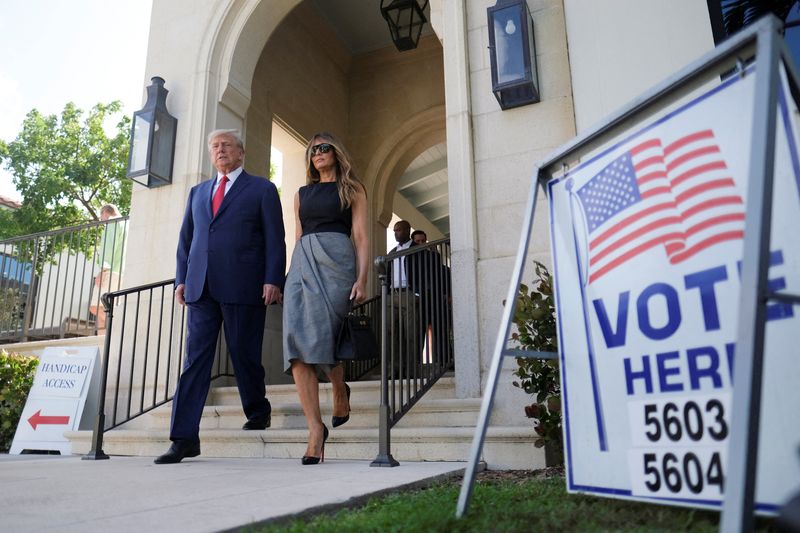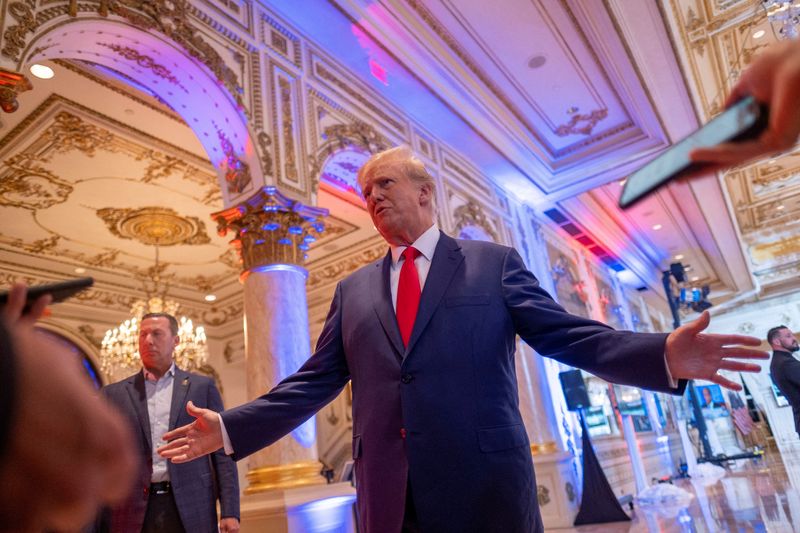By David Morgan, Gram Slattery and Jason Lange
WASHINGTON (Reuters) - Donald Trump emerged from Tuesday's midterm elections with a tarnished reputation as a Republican kingmaker, after poor performances by some of his high-profile endorsements left the party struggling to gain control of the U.S. Senate.
Losses among candidates endorsed by the former president also hurt Republicans in the House of Representatives, where the party was expected to win control by only a slim margin, despite earlier hopes of picking up as many as 30 seats.
"It's not a question of whether it was a negative, it's a question of how negative it was," Rob Jesmer, a Republican strategist and former executive director of the party's Senate campaign arm, said of Trump's influence on the outcome.Celebrity doctor Mehmet Oz lost a Senate race in Pennsylvania to the state's lieutenant governor John Fetterman, a key pickup for Democrats that increases their odds of holding their razor-thin majority. Former NFL football star Herschel Walker trailed Democratic Senator Raphael Warnock in Georgia, as the two headed to a Dec. 6 run-off election.
Republican Blake Masters, an investment executive, also trailed Democratic Senator Mark Kelly in Arizona, while a Nevada contest between Democratic Senator Catherine Cortez Masto and Republican Adam Laxalt was not yet called.
In the House, Trump-endorsed candidate John Gibbs was defeated by Democrat Hillary Scholten in Michigan, while Republican Joe Kent trailed Democrat Marie Gluesenkamp Perez in Washington state.
But Trump-backed Senate candidates J.D. Vance of Ohio and Ted Budd of North Carolina both emerged victorious, as did a slew of incumbents that Trump endorsed, including House Republicans Russell Fry of South Carolina and Harriet Hageman of Wyoming.
The election results raised questions about Trump's political brand, while increasing the odds of a competitive 2024 race for the party's nomination, after Florida Republican Governor Ron DeSantis, a potential rival for the nomination, scored a blowout reelection victory.
Trump, who has hinted that he will launch his third consecutive White House run next Tuesday, seemed undaunted.
"While in certain ways yesterday's election was somewhat disappointing, from my personal standpoint it was a very big victory," the former president said in a post on his Truth Social online platform.
Trump endorsed more than 200 candidates in Tuesday's elections, most of them Republicans in safe seats who analysts said would have succeeded anyway.
Republicans had headed into the election with high hopes of capturing both the House and Senate, given Democratic President Joe Biden's low job approval numbers and voter concerns about inflation. They also had the advantage of historical trends that penalize the party of a sitting president in midterm elections
UNTESTED CANDIDATES
But party strategists said Trump's choice of political novices and others who embraced his false claims that the 2020 election was stolen, proved unattractive to voters.
Among 12 prominent endorsements, which started with primary challenges to incumbent Republicans, four won election in Tuesday on Tuesday, while two lost. Three remained uncalled and three lost their primaries.
"That issue in particular, and Trump's visage, and his ownership of the Republican ticket out here, I think creates significant problems," said Chuck Coughlin, a Republican strategist in Arizona, where Masters trailed Kelly by five percentage points.
"With the immigration crisis the way it is, the way inflation is, it should just be a walk in the park for Republicans."
Trump is still a revered figure within the Republican Party, with three-quarters saying in an October Reuters/Ipsos poll that they were more likely to vote for a candidate who supports Trump or is endorsed by him.
The populist priorities of his "America First" agenda and his combative political style also helped shape the overall Republican campaign.
But, like Biden, Trump remains unpopular with the public at large, after a divisive four-year term that ended with the Jan. 6, 2021, assault on the U.S. Capitol by his supporters, followed by months during which he has continued to claim falsely that his election defeat was the result of fraud.
Republicans also complained that Trump did not aggressively back up his endorsements with money, despite his fundraising prowess.
Trump's main money-raising group, Save America, raised more than $138 million through Oct. 19, largely from small donors, according to financial disclosures. Save America contributed close to $30 million to political allies and Republican Party accounts, including $20 million in October to a group that ran television ads supporting Republican Senate candidates in Georgia, Pennsylvania, Ohio, Arizona and Nevada.
A Trump adviser said the former president helped raise $350 million for party committees by attending fundraisers and allowing the use of his name in digital and direct-mail solicitations.

But Save America's contributions paled in comparison to spending by the Senate Leadership Fund, or SLF, a leading political action committee aligned with top Senate Republican Mitch McConnell.
As of Nov. 1, SLF and affiliated groups American Crossroads and Faith & Power PAC had spent $237 million.
